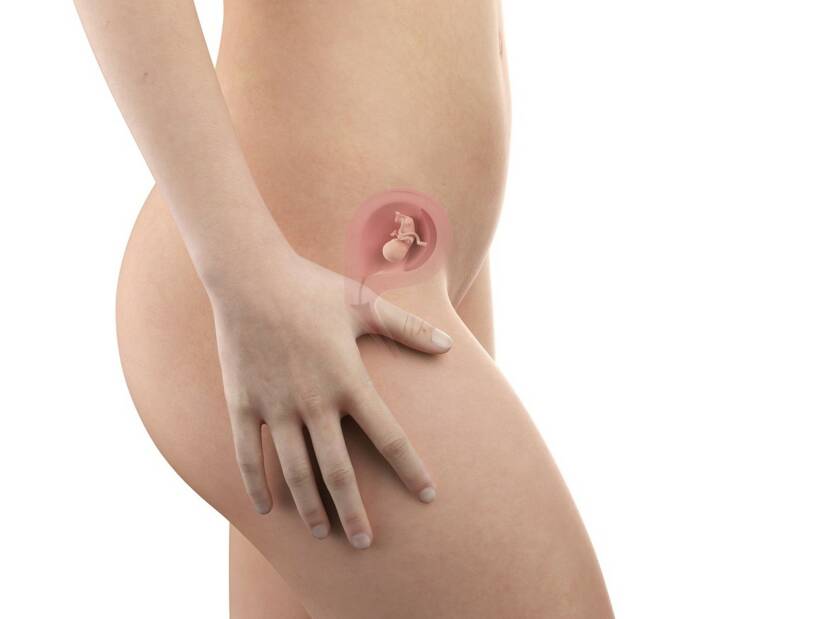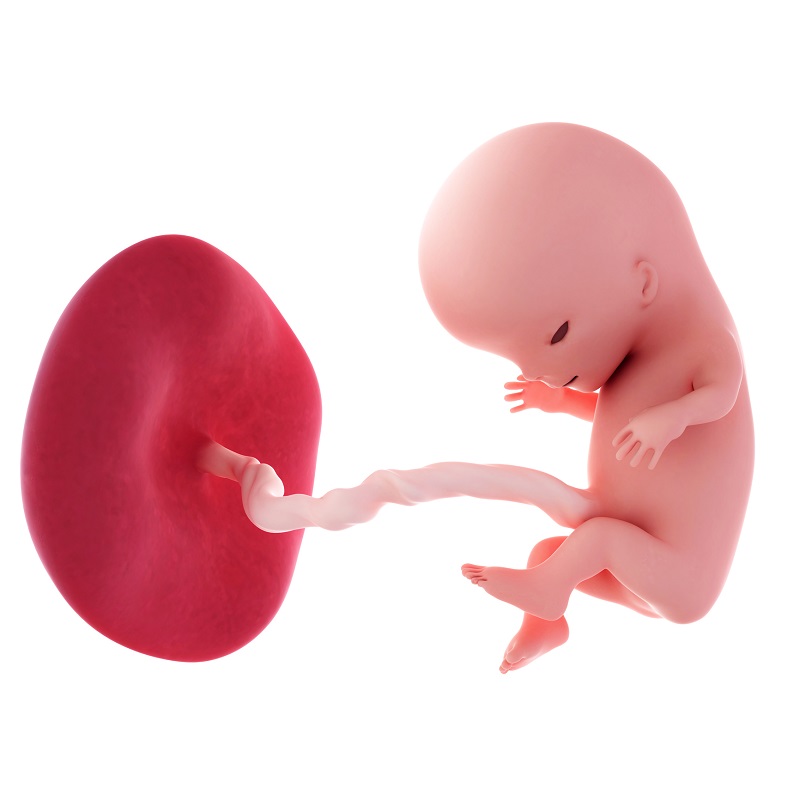- Pregnancy and Childcare - Jane Symons
- The Miraculous Journey to Life - Rainer Jonas
- verywellfamily.com - Week 11 of Your Pregnancy
- healthline.com - Hyperemesis Gravidarum
- whattoexpect.com - 11 Weeks Pregnant
Week 11 of pregnancy: is it already possible to distinguish the sex of the baby?

Your baby already looks like a little person. The embryonic stage is complete and from this week onwards your baby is considered a fetus. All the baby's organs have formed during the embryonic stage. Now they will only grow and mature.
Article content
11 weeks pregnant, you're two months and three weeks along. You're about to finish your first trimester.
How's your baby developing in your tummy?
By the 11th week, the fetus is already beginning to take on the real shape of a baby, even though it is still too small.
Its size is approximately 41-53 mm and its weight is 7-10 g.
It's amazing. It's been such a short time since fertilization, and your baby is a little person this week with existing bones, joints, and muscles.
The critical period of fetal development is over. No more birth defects should have developed by this time, as your baby is already developed. The phase of rapid growth and weight gain is beginning.
Even if you can't feel your baby's movements yet, he is already busy exercising, stretching, twisting, like a little acrobat.
The table shows the approximate measurements of the fetus at 11 weeks, as measured by the sonographer
| CRL Distance from vertex to coccyx | Weight | HC Head circumference | BPD Transverse head diameter | AC Abdominal circumference | FL Femur length |
| 41-53 mm | 7-10 g | 59 mm | 16 mm | 52 mm | 8 mm |
Read more about fetal size in the article:
Ultrasound in pregnancy: fetal size, what is fetal biometry?
The head of the fetus is about half the length of its body.
Its brain is already sending signals to the muscles, and the baby is kicking and exercising strongly in the amniotic fluid.
Its head is producing 250,000 nerve cells a minute. Its brain will continue to develop and improve. The finished brain has billions of them. But the dissemination of information is not 100%. The brain cells are just coming into place in the head.
The swallowing and breathing reflexes are activated, the baby begins to inhale and exhale amniotic fluid.
The kidneys, whose development is complicated and takes a long time, are already beginning to produce urine. The fetus is already emptying its bladder into the amniotic fluid. The kidneys are not yet in their final place in the fetal body.
By swallowing amniotic fluid regularly, it trains the kidneys, preparing the stomach and intestines for later function.
His intestines are still developing. At this time, they are larger than his abdomen. Some of them are in the umbilical cord, where they will move to their proper place in the abdomen as he develops. Although they are still developing, they are already beginning to process the sugar and water that the fetus swallows.

The sex of the baby can already be distinguished.
By the 11th week, the fetus has formed a nose and lips. The nasal passages are open at the tip of the nose and continue to form. The eyes, tongue and palate of the mouth are developing.
The eyelids close and fuse in this week. Underneath, the iris is developing.
The fetal ears have moved closer to the target site on either side of the head. They are almost in final form.
The nipples on his chest are already visible.
The bones are slowly hardening.
Your baby's hands and feet are already distinct. The fingers and toes are formed, already separating and looking like real baby body parts. The nail beds are beginning to develop with soft marigolds.
Your baby will now grow at a great speed.
Between the 11th and 12th week, its weight will increase by almost 60%.
How does a woman feel in the 11th week of pregnancy
Pregnancy fatigue is normal. You feel tired and overworked, even if you are not doing anything that should make you feel tired. This is because your body is working at a higher speed even at rest. It has to nourish your body along with nourishing the fetus.
Gradually, you will feel less fatigue than in the previous weeks. Your energy should increase once the placenta is up and running and your body adjusts to the hormonal changes of pregnancy.
Your breasts are larger and fuller, with increased tenderness, soreness to touch. They are getting bigger in preparation for breastfeeding.
Morning sickness slowly subsides, although nausea and vomiting may surprise you at times during the day or night. Usually this feeling disappears between the 12th and 16th week, but some pregnant women may suffer from nausea throughout their pregnancy.
If you cannot keep liquids and food in your stomach and suffer from vomiting after eating, contact your gynecologist. The doctor will use an examination to rule out hyperemesis gravidarum. This may require medical attention or hospitalization to keep you and your baby safe.

The table shows the difference between morning sickness and hyperemesis gravidarum
| Morning sickness | Hyperemesis gravidarum |
|
|
Many pregnant women also experience food aversion. Just the thought of a particular food that they had previously eaten without any problems makes them feel disgusted or even nauseous. These aversions are often associated with morning sickness.
Food cravings or mixing of different tastes, such as cucumber with cake and a schnitzel, with ice cream for good measure, are common. These pregnancy cravings are quite common and most often begin to appear at the end of the first trimester, and later begin to subside.

You may already be hungry more often, the morning sickness gradually eases and the appetite increases to allow the fetus to nourish itself.
Well, hormones play an important role and your body is flooded with them, especially at the beginning of pregnancy.
Your sense of smell is overly sensitive, you may feel like a tracking dog. When you walk past your neighbour's door in the house, you know what he has been cooking. At the same time, you may develop a complete aversion to certain smells and foods or, on the contrary, an indescribable craving for a particular food.
Sometimes you may even experience a feeling of unpleasant heartburn.
The pregnancy hormone progesterone maintains a healthy pregnancy, but it makes you start to feel bloated, gagging and gassy. Progesterone relaxes the smooth muscle tissues, including the gastrointestinal tract. It slows down digestion so that more nutrients are absorbed into the blood and nourish the baby.
Bloating and a feeling of fullness are common symptoms of pregnancy. They appear at the earliest in the 11th week of pregnancy and may persist throughout pregnancy until delivery.
Uncomfortable abdominal fullness, especially after eating, will get worse for some women. As the uterus grows, it will put more pressure on the intestines and stomach. This will put more pressure on the digestive tract, and you will feel even more full, bloated. Try to limit foods that bloat, fried foods, bubbly drinks and sweets.
Frequent urination. You feel like you have to pee every 10 minutes during the day, and you wake up more often at night. Waking up because you need to urinate interrupts your sleep, and you may feel more tired during the day.
Frequent urination is one of the early signs of pregnancy. It starts in the first trimester and can get progressively worse, especially towards the end of pregnancy.
What causes frequent urination in pregnancy?
The hormone hCG increases blood flow to the pelvic area. This promotes kidney function and increases the excretion of waste products in the urine and from the fetus.
Increased urination is also due to the growing tummy. Its pressure changes the volume of the urinary space and reduces the volume of the bladder. With swelling of the lower limbs, the swelling decreases during sleep and the excess fluid is excreted by the kidneys.
Dizziness, feeling unsteady and lightheaded are common during pregnancy. Your body is not yet producing enough blood to fill the blood vessels of the circulatory system. The hormone progesterone increases blood flow from the mother to the fetus, which can lead to a decrease in pressure and blood flow to the brain. This causes dizziness.
Inflamed and bleeding gums are common in pregnancy. Tooth and gum sensitivity may also increase. The pregnancy hormone estrogen has an effect on the gums.
Leg cramps can bother you at any time of the day or wake you up at night during sleep. The most common cause is a decrease in magnesium levels in the blood from its overconsumption by the body.
What can you notice?
You may notice increased vaginal discharge. Increased production of white or clear-colored vaginal mucus is a result of increased hormonal activity.
You can read more about pregnancy discharge in our article:
Discharge in pregnancy. What is considered normal discharge? And how does an infection manifest itself?
You may have noticed that your hair grows faster and your nails get beautifully longer.
Your nipples are protruding more than usual, your areolas are getting darker and bigger.
Your skin is drying out, it's dry and you may feel itchy.
Some mums-to-be have also noticed increased, excessive salivation. This is not a disease, it is normal.
What kind of examinations can you expect at the pregnancy clinic at the 11th week?
You will visit the antenatal clinic once a month in the early stages of your pregnancy.
During your regular check-up at the antenatal clinic, they will always take your blood pressure and pulse, record your weight and examine your urine.
You should be seen by a gynaecologist and have a sonogram between 11 and 13 weeks. If you haven't had one yet, your doctor will definitely do one this week.
During the sonogram, your gynaecologist will check whether the pregnancy is progressing well and whether there is one or more foetuses in the uterus. Abnormalities such as ectopic pregnancy or silent miscarriage are monitored.
From the 11th week onwards, the size of the fetus is measured sonographically, the activity of its heart is monitored and its heartbeat is listened to. It is in this week that you will hear your baby's heart beating.
Blood draw for 1st prenatal screening PAPP A test and beta hCG blood test, to screen for Down syndrome and other chromosomal abnormalities.
If you are curious, you can also ask for a test to determine the sex of the fetus, called as BABY GEN TEST.
If you have not had a blood draw in the previous weeks, an initial laboratory test will also be done by the 11th week. Your blood group and Rh factor will be determined, your blood count will be checked, and blood will also be drawn for infectious tests such as hepatitis B, toxoplasmosis, and other serological tests.
What do we recommend?
- Be careful, do not overexert yourself, do not lift heavy objects.
- Avoid infections, colds.
- It is recommended to take prenatal vitamins to provide you and your baby with the necessary vitamins.
- Eat a healthy diet with adequate intake of vitamins from your diet, add vegetables and fruits to your diet.
- Don't stick to the eat for two rule so you don't gain weight unnecessarily.
- Maintain your blood sugar levels by eating complex carbohydrates and proteins such as cheese, nuts, and dried fruits.
- Don't forget to drink.
- Don't wear tight clothes. Reach for looser, comfortable clothes instead. Your tummy will gradually start to get bigger and protrude. You'll probably start to have trouble buttoning your pants, so don't push it unnecessarily.
- Wear a comfortable cotton bra; your breasts are now sensitive and painful.
- Increase your oral hygiene. In pregnancy it is more prone to bleeding, swelling and the development of infections.
- Exercise can actually give you energy. Pregnancy yoga is a great exercise that can help you feel more relaxed during pregnancy and more prepared for childbirth.
- If frequent urination is something that can bother you, try to avoid caffeine, as it increases urine output. Try to limit your fluid intake in the evening before bed so you don't have to wake up in the night because of the need to urinate.
- Regularly lubricate your skin, which is more prone to dryness and itching.
- Avoid chemicals, aggressive cleaning products and their contact with your skin. All substances in contact with your skin pass through your skin to the foetus.
- Be especially careful with cosmetic procedures, hair dyeing, rather reach for natural products.
Read also other interesting articles:
- How much to gain weight during pregnancy? What does it depend on and what to look out for?
- Sex during pregnancy. What to watch out for and what changes does it bring with it?
- Is it dangerous and how is it treated?
- Head spinning in pregnancy: at the beginning and as a symptom, what else does it mean?
Read more about the other weeks of pregnancy in the summary article:
Pregnancyby weeks.
Gallery



Interesting resources
Related










